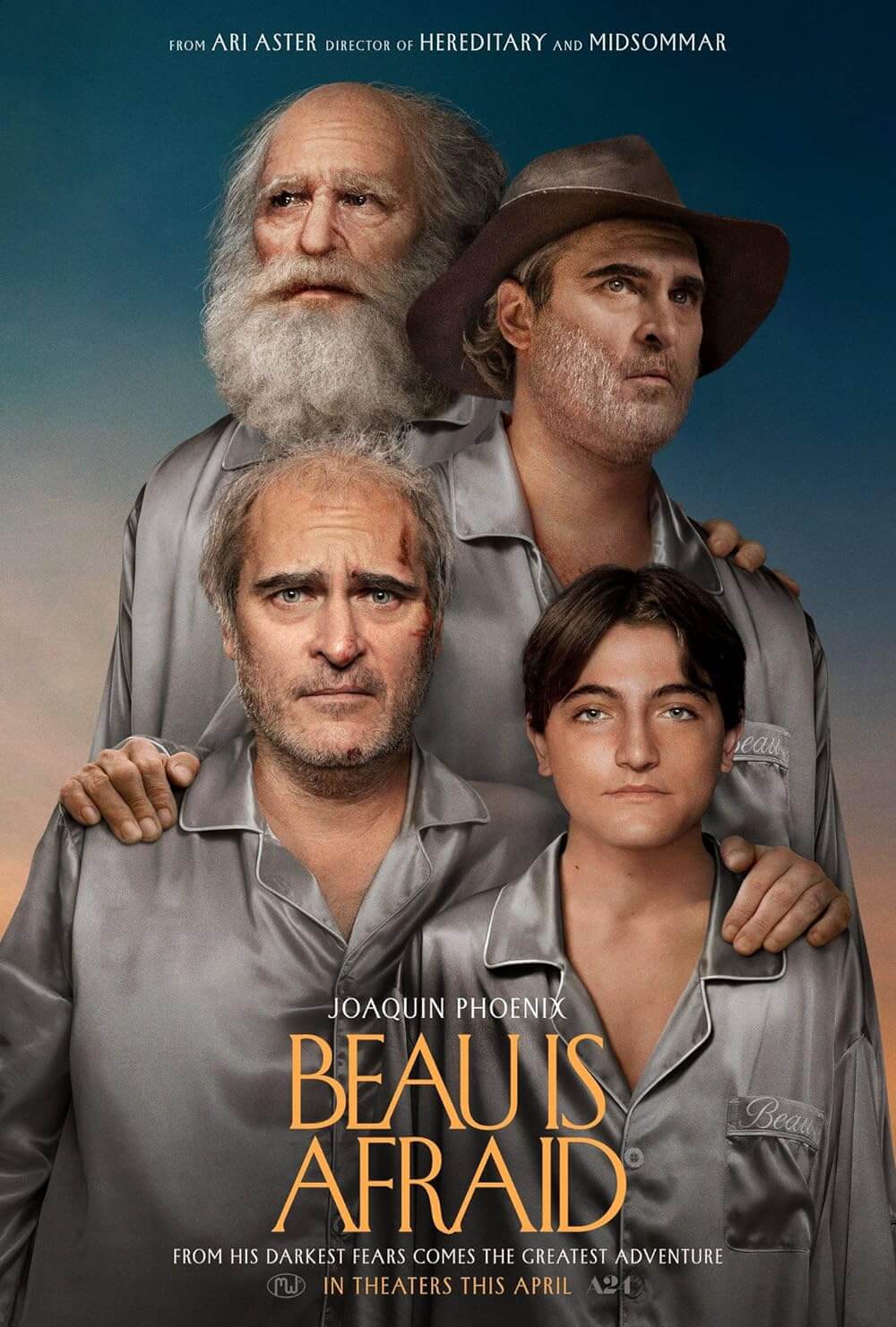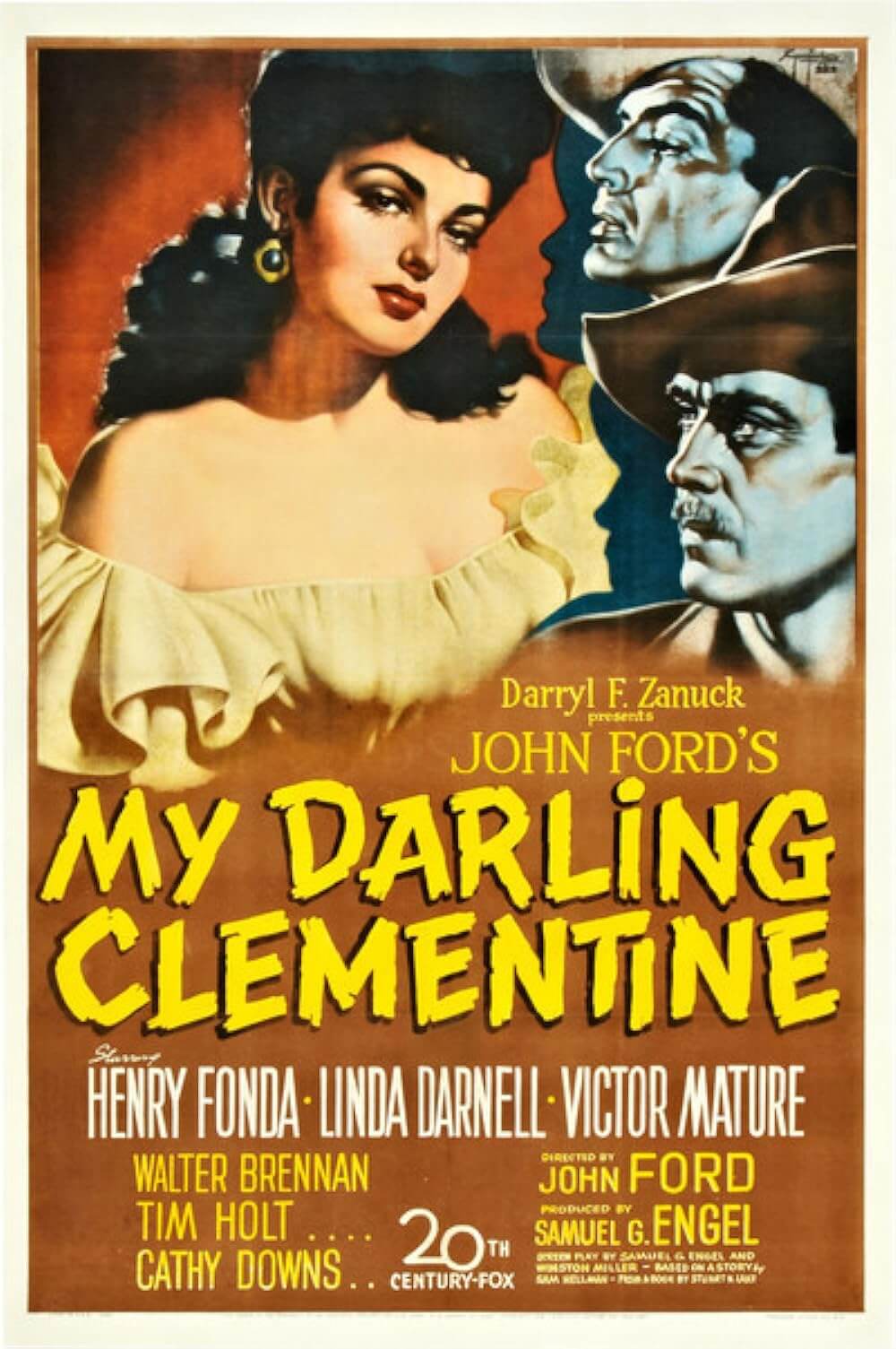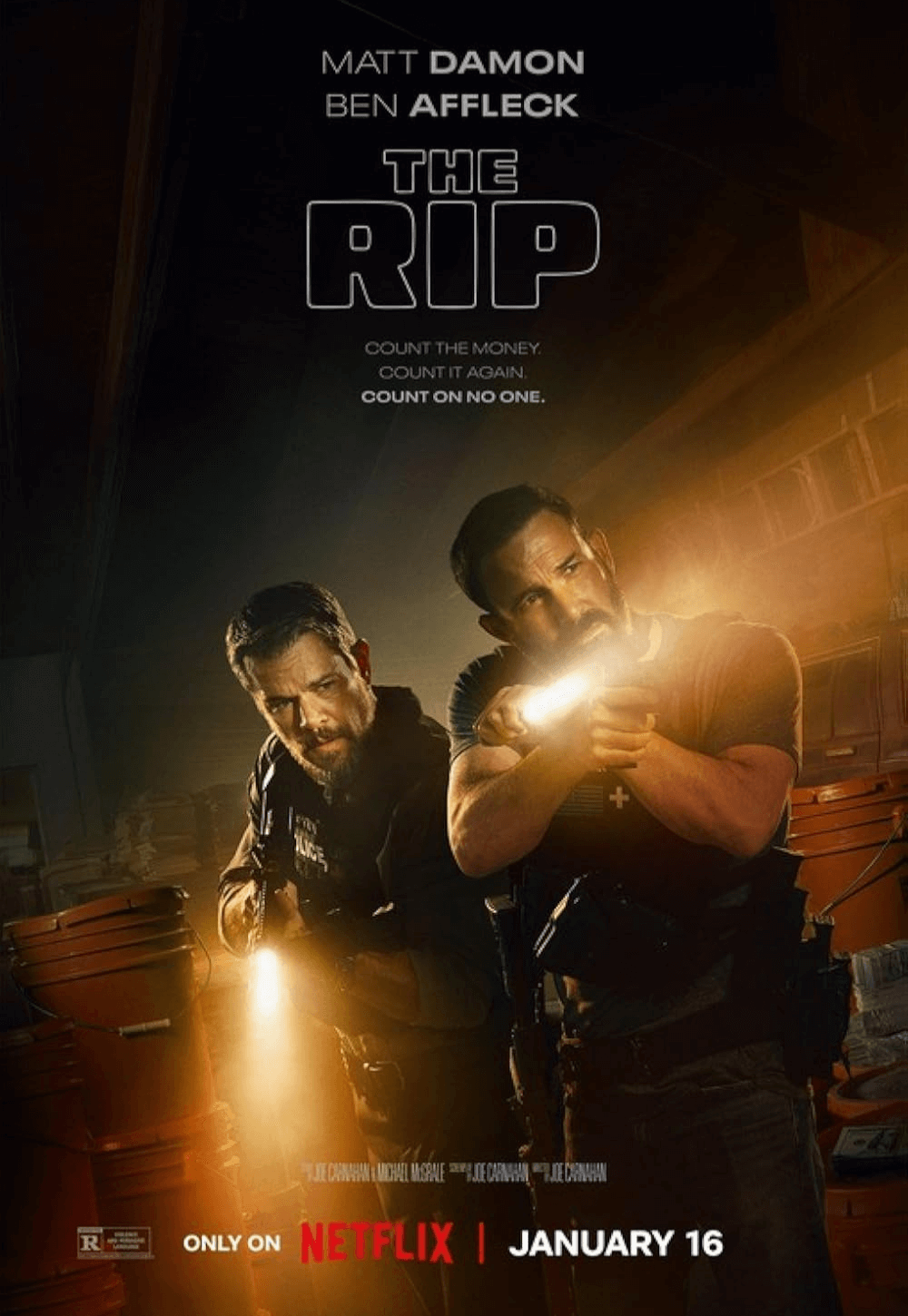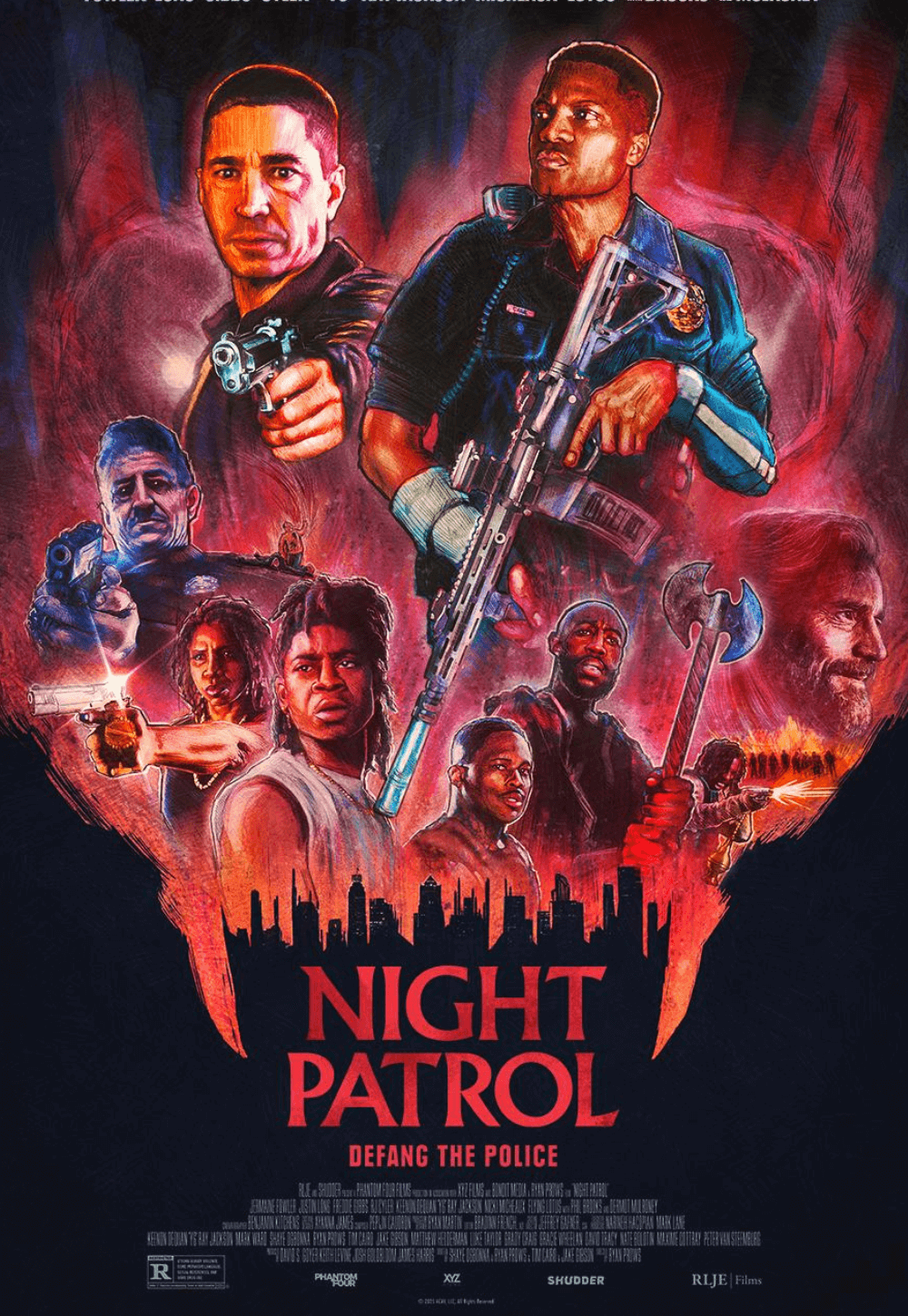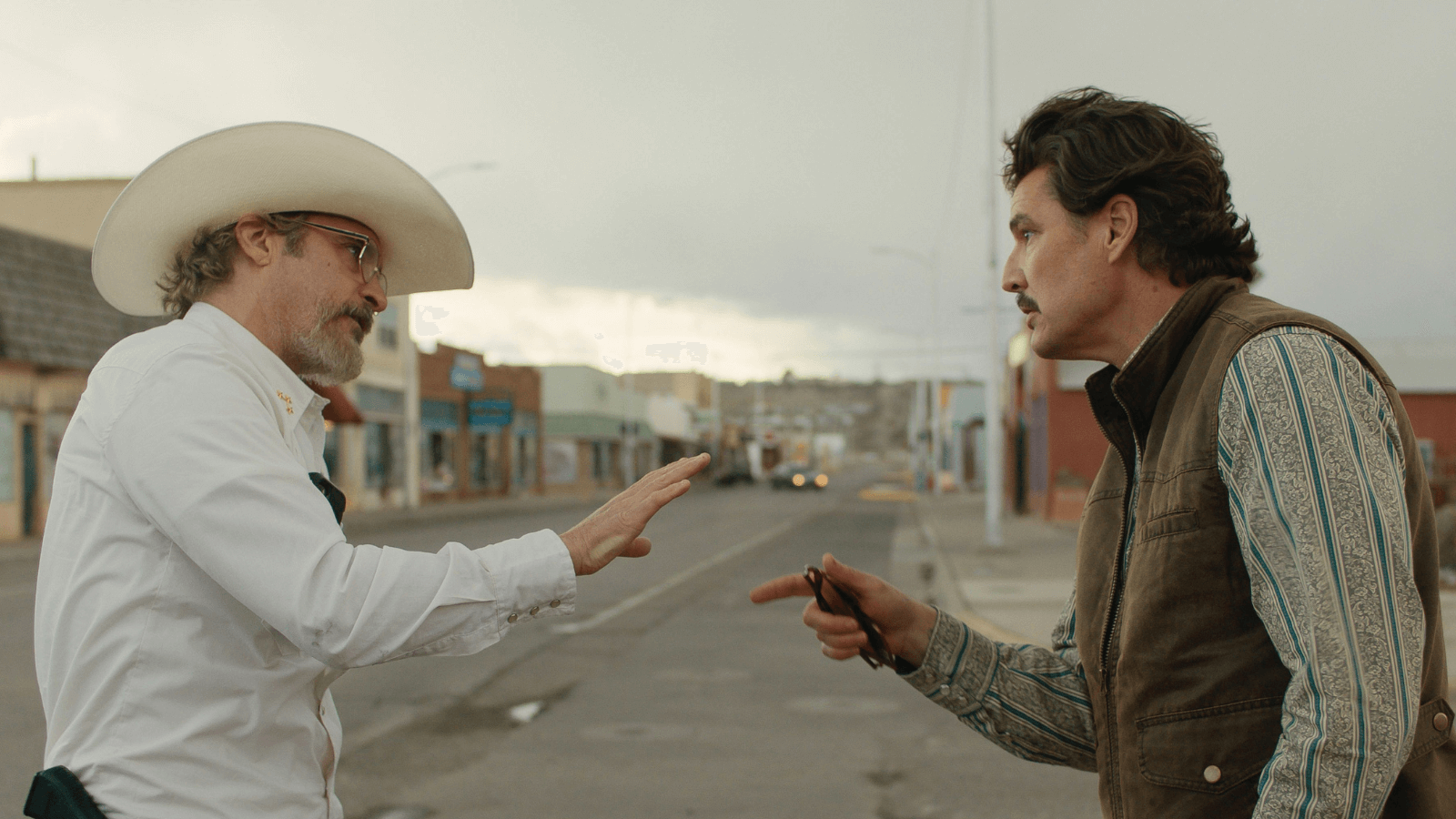
Eddington
By Brian Eggert |
Ari Aster dissects the culture war with Eddington, a portrait of how COVID-19 irrevocably tore America apart at its already frayed seams. The pandemic intensified partisan rancor, social fragmentation, and reactionary behavior—conditions that enabled opportunists to seize power amid the chaos and, ultimately, profit from it. Set in late May 2020, the film looks back five years at the titular New Mexico town, seemingly in an attempt to understand what led to the erosion of democracy in Trump’s America today. Described as a Western in the promotional materials, it’s also a period piece, though the time hardly feels that long ago, much to the film’s detriment. Still, Aster captures the uncertainty, paranoia, and desperate search for answers that drove people to rely on the worst possible source: social media. Rather than offering clarity, it only deepened the divide between the right and left, as both sides leaned into their worst impulses and most extreme reactions. Fortunately, Eddington boasts an excellent cast, led by another tour-de-force performance by Joaquin Phoenix under Aster’s direction. It’s unquestionably well-crafted and brimming with the director’s anxiety-ridden style. But the question remains: Is now the right time for Eddington?
At the moment, this all-too-relevant A24 release feels like an unwelcome reminder of the recent past. Admittedly, I found myself not wanting to relive a period that many still haven’t fully processed—myself included. The film’s cute tagline (“Hindsight is 2020”) suggests Aster has summed up one of the most sociopolitically significant and chaotic years in my lifetime. 2020 was marked by George Floyd’s death, the Black Lives Matter protests, wildfires in Australia and California, Trump’s impeachment, the UK’s official withdrawal from the European Union, Ruth Bader Ginsburg’s passing, a stressful election, and so on. Given how fast things change these days, the year feels at once like it was just yesterday and a foggy nightmare from which I still haven’t awoken. Either way, I’m not sure Aster can distill the feelings of a whole town, much less an entire country, in a single feature—even one running 149 minutes—but his attempt is admirable, even inspired. Regardless, Aster tries, and his observations remain astute, if not particularly pleasant. Remember grocery store arguments with dipshits who wouldn’t mask up? I do, and I don’t particularly want to reexperience that chapter in my life right now.
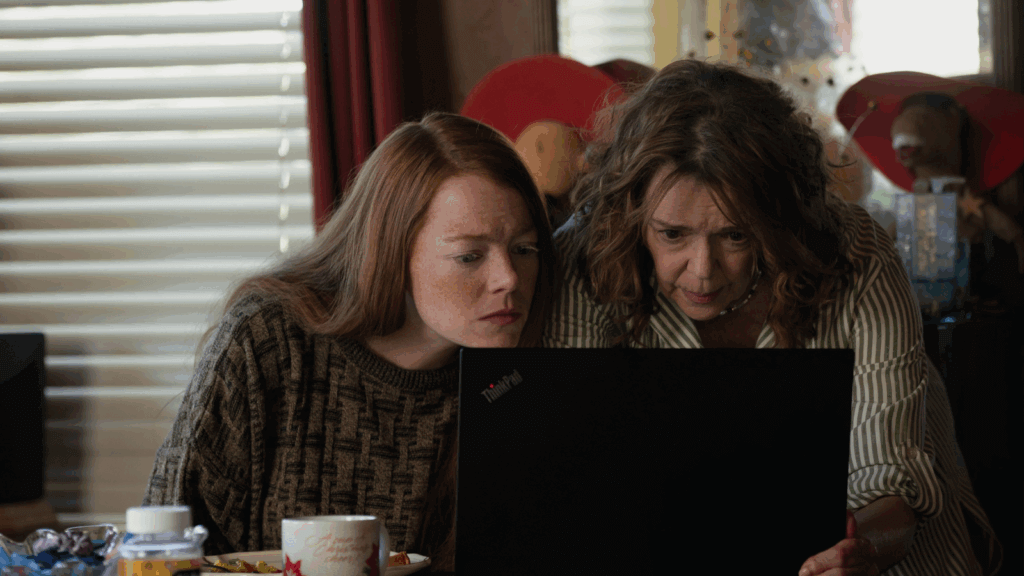
Whether or not we’ve recovered as a species from the collective trauma of the pandemic to warrant a film about it is debatable. Nevertheless, Aster rushes headlong into the warped life of Joe Cross (Phoenix), a pathetic and sexually frustrated local sheriff who wants everyone to respect his authoritah. Joe lives with his wife, Louise (Emma Stone), who spends her time at home, adding to her online store’s inventory of morbid cloth dolls and paintings. He even convinces Eddington’s two subordinate officers to buy them to boost her morale (he pays them back afterward). Louise takes after her mother—Dawn (Deirdre O’Connell), who lives with them, much to Joe’s frustration—and shares her interest in far-right numerological Q-Anon conspiracies and a culty online guru (Austin Butler). On the job, Joe must contend with state mask mandates, enforced by the liberal, business-minded Mayor Ted Garcia (Pedro Pascal), who’s trying to push through an AI data center called solidgoldmagikarp. The center promises to boost Eddington’s economy, but it will also consume vast quantities of the sparse local water resources. Some aren’t convinced the new venture will produce the promised jobs and modernization Eddington needs, and Joe is among them.
Joe despises Ted, and not just because the mayor has confronted him multiple times about wearing a mask—a directive the asthmatic sheriff refuses to uphold. Joe and Dawn maintain that, long ago, when Louise was sixteen, Ted took advantage of her and forced her to get an abortion, which the mayor denies (and soon, so does Louise). This claim, along with his general dislike for Ted and nagging mask mandates, inspires the sheriff to announce his run for mayor, complete with a bevy of bad campaign slogans (“Your Being Manipulated”). Joe’s utter lack of professionalism and disregard for police procedure result in an encounter at Ted’s house that sends the sheriff over the edge. Meanwhile, the culture war spills onto the streets of Eddington, echoing the BLM protests erupting across the country. Liberal youths, fueled by hormones and Instagram fervor, take to the town’s main drag to protest the police. Though, for some, the motivation seems less about ideological convictions and more about impressing someone they find attractive. Their presence incites an unraveling Joe to regain control by any means available. And that includes examining his staff’s (Luke Grimes, Michael Ward) presumed racial motivations, as well as dealing with the mayor.
An alternate title for Eddington might be Lemmings (one of the film’s early poster concepts involves three buffalo running off a cliff). The film shows how often people just repeat what they read online or watch on Fox News, and then act in ways that not only prove self-destructive but also harmful to their community. Aster’s cynicism toward online discourse amounts to depicting a bleed-over effect from posts and videos shared on the web to real-world actions. “Don’t make me think,” Joe says after recording a reckless video where he calls Ted a sexual predator. “Post it!” Everyone gets their information from various culturally fragmented sources, some more dependent on feelings than facts, and when they discover that other people don’t think the way everyone in their bubble does, they go berserk. The situation spirals out of control with a literal dumpster fire, leading to Aster’s third act, which will surely spark some debate—it’s the sort of finale one expects from this director, complete with outlandish violence and coda scenes with an odd poignancy. Misguided officials and rogue Antifa members shoot holes in one another until a frustrating conclusion that replaces catharsis with a stinging realization that none of this matters. Those in control will get what they want: a solidgoldmagikarp facility.
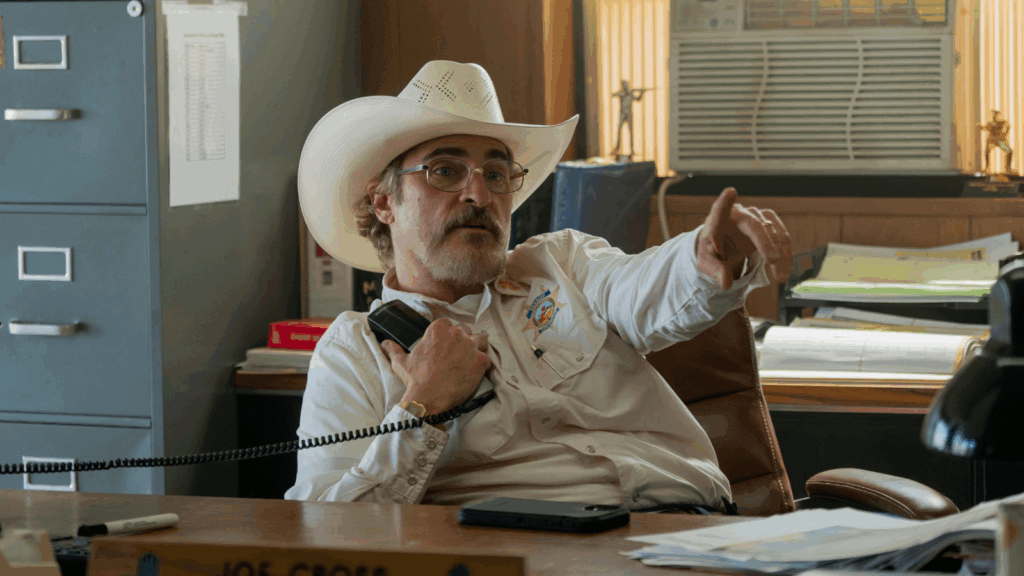
Less formally audacious than Aster’s other films, particularly after the deliriously and delightfully overstuffed Beau Is Afraid (2023), Eddington is nonetheless a smartly assembled and immersive viewing. Even its lengthy runtime passes faster than one might expect. Darius Khondji’s textured cinematography follows the film’s characters in long takes, while Lucian Johnston’s editing never calls attention to itself. As for the script, Aster shared on the A24 podcast that he wrote the root story several years before debuting Hereditary (2018), and it wasn’t until the pandemic that he found a way to crystallize his remarks about Americans’ penchant for knee-jerk reactionism and capitalistic opportunism. Whatever remains of the original story hardly matters; what we’re left with feels whole and reminds us that, in a few memorable works, Aster has consistently balanced maddening anxiety, mordant humor, and impressive craft. In particular, his ability to direct great performances from his cast should not be overlooked. Phoenix is superb, but so are Pascal, O’Connell, Stone, Butler, and the entire ensemble. Aster has a knack for casting actors who have the skill to modify their performances to align with his shifting moods and hints of macabre and psychosexual surreality.
Most movies feel like short stories; however, Ari Aster makes movies that feel like novels. His film isn’t a straightforward scenario that results in escape or emotional release. He traps his viewers for two-and-a-half hours, plunges a knife into the audience’s collective brain, twists it, and leaves it there. Eddington pinpoints the problem—specifically, that the culture war frames people with differing opinions as obstacles that need to be taken care of (cue Jules Winnfield’s finger-gun gesture: “You mean, take care of him?”)—but it offers no solution. One of the final moments even suggests the partisan violence will no doubt continue, just as the people who scheme to make millions from the conflict will rake in the dough from our infighting. It’s a brutal reality that brings us to the present day. Aster’s shrewdly observed fourth feature might play better ten or fifteen years from now, after the fascist streak in America (hopefully) peters out. And when that day comes, and I feel emotionally equipped to look back at this era, Eddington may feel like no one else had sized up America quite like Aster did. It’s an engrossing and exceptionally well-made film if you want to subject yourself to the material, but that’s a big if.

Thank You for Supporting Independent Film Criticism
If the work on DFR has added something meaningful to your love of movies, please consider supporting it.
Here are a few ways to show your support: make a one-time donation, join DFR’s Patreon for access to exclusive writing, or show your support in other ways.
Your contribution helps keep this site running independently. However you choose to support the site, please know that it’s appreciated.
Thank you for reading, and for making this work possible.
Brian Eggert | Critic, Founder
Deep Focus Review


